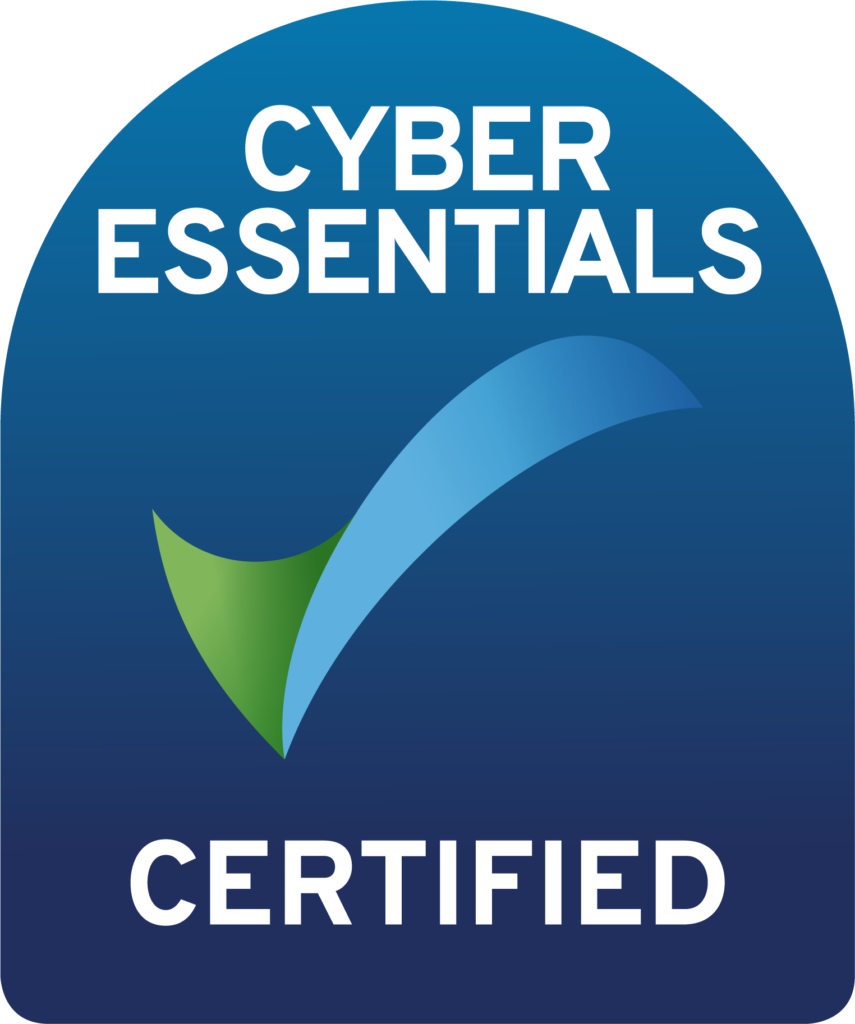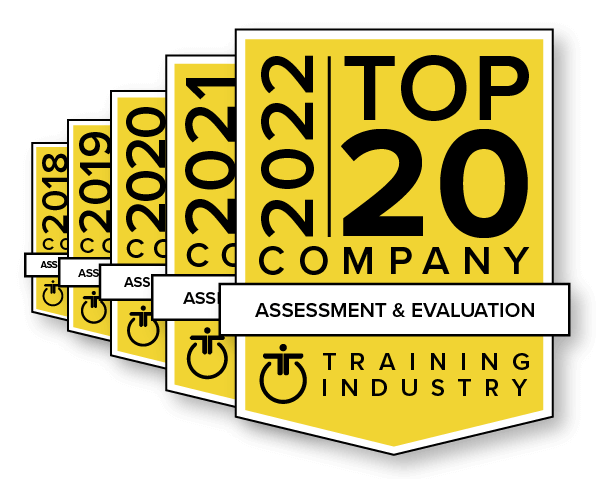Coaching in the workplace has many benefits for the coach, the person being coached, and the organization. The organization benefits from higher retention, higher level of engagement, and a deeper and more confident talent pool. The coach benefits from effective and productive employees. And the employee being coached benefits from rapid learning and a sense of belonging.
But too often managers are hesitant to embrace their role as coach, preventing everyone from seeing these benefits. Why does this happen? In order to fully realize the benefits of coaching in the workplace, it’s essential to answer this question.

Some of the reasons managers might hesitate to step into coaching include:
- Not taking the time to establish the coaching relationship
- Not identifying the technical skills that team members need to learn
- Lacking the relational skills required to communicate effectively
- Not viewing discussions about company culture as coaching interactions
Any one of these reasons can be enough for a manager to resist coaching. Below, I’ll share some advice on how to address each of these reasons and the benefits you can realize through effective coaching in the workplace.
The benefit of taking time to establish the coaching relationship in the workplace: higher retention
Often, when a manager adds a new person to the team, they don’t set up the coaching relationship from the start. To establish a coaching relationship with new hires, managers should talk with them:
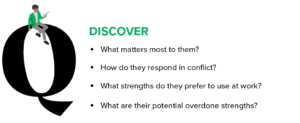
During this conversation, coaches should share their own answers to the above questions, too. When the coach and employee take the time to compare their answers to these questions, they have a far greater likelihood of identifying potential roadblocks to a productive coaching relationship.
Pay particular attention to the first question about what matters most to them. Understanding the importance of motivation provides a healthy foundation for the coaching relationship to develop a high level of productivity and trust, and genuine sense of safety for the employee.
The benefit of coaching on technical skill development in the workplace: higher engagement
I once worked with a client, a frontline manager, who struggled to develop the technical skills of her team because she had not taken the time to break down the five to ten skills that each team member needed to know. As a result, she struggled to be sure how best to develop and evaluate these skills in others. Understandably, she was hesitant to coach in this situation!
Once she identified the essential skills to being technically competent and helped her employees build these skills, she gained confidence. Then she realized that coaching is not simply training someone to do something. Coaching is more about learning together.
Managers and team members can share the responsibility for developing the skills needed to be successful. And when a manager and a member of their team develop technical skills together, both realize the benefits of coaching in the workplace.
The team memberrealizes that their manager is truly invested in their professional development and feels empowered to have a say in their learning trajectory. The manager understands what each team member needs to know to be good at their job—and gets more excited about coaching.
Technical coaching isn’t all about teaching. It’s also about learning together.
The benefit of coaching on relational and communication skills in the workplace: deeper and more confident talent pool
Technical skill development alone will not help people reach their full potential. Coaches must be prepared to coach on relational skills as well.
Most managers know the technical skills and how to teach them, but they hesitate to coach on relational issues or conflict. If the manager and employee have established their relationship in terms of motivation, response to conflict, and strengths, coaching on relational skills becomes much easier.
To successfully coach on the relational portion of the job, it helps to understand what Core Strengths calls Relationship Intelligence, or RQ. We define RQ as insight for adjusting your approach to make interactions more effective.
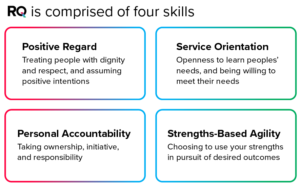
Managers who work to build these skills in themselves will gain the confidence to coach on them, too. And because coaching is a two-way relationship, relational coaching is another area where managers can learn together with their teams.
It’s important for the manager and each team member to have intentional conversations where they examine their similarities and differences. As they build individual Relationship Intelligence and bring it to the coaching dynamic, they’ll come to value their similarities, appreciate their differences, and see them as a way to do excellent work together.
The benefit of coaching to understand the culture of the workplace: increased sense of belonging
When Americans first visit Paris, many are surprised by how late dinner is. You can’t make a restaurant reservation until 7:00 pm, and even at that hour, you’ll be the first to arrive. Many people eat as late as 9:30 or 10:00 pm.
Every organization has a ‘late dinner in Paris’ aspect: something within the system that differs from an employee’s previous life experience. And it’s the manager’s job to bring light to these elements of the system.
Many managers don’t realize the importance of coaching about the culture of the organization, because these conversations can veer into company politics. But coaching on company culture doesn’t have to be uncomfortable. Part of the awkwardness will melt away when a manager starts the conversation intentionally, saying something like, “Today we’re going to talk about how you, I, and our team fit into the organization.”
Some questions to ask employees when coaching about the culture include:
- Do you feel comfortable being yourself in the systems of our team and the organization?
- What strengths or personality traits do you bring to these systems that let you contribute something different from others?
- What surprised you about our organization when you first started working here, or first joined this team?
Being curious about the culture and discussing it will help both the manager and the employee gain new perspectives on their individual and shared roles within the team and organization.
Conclusion
When you see all the areas that coaching encompasses, it’s easy to understand why some managers are hesitant to coach.
But with high-quality coaching relationships, work will become a place where managers and team members alike learn how to appreciate and engage people who are different from themselves. Unless managers understand and overcome their hesitancy to coach, the benefits of coaching—higher retention, higher levels of engagement, greater productivity, a deeper and more confident talent pool, and an increased sense of belonging—will not be fully realized.
Learn about the SDI 2.0 Assessment and Relationship Intelligence to build effective coaching relationships and unleash the power of leadership at your organization.


